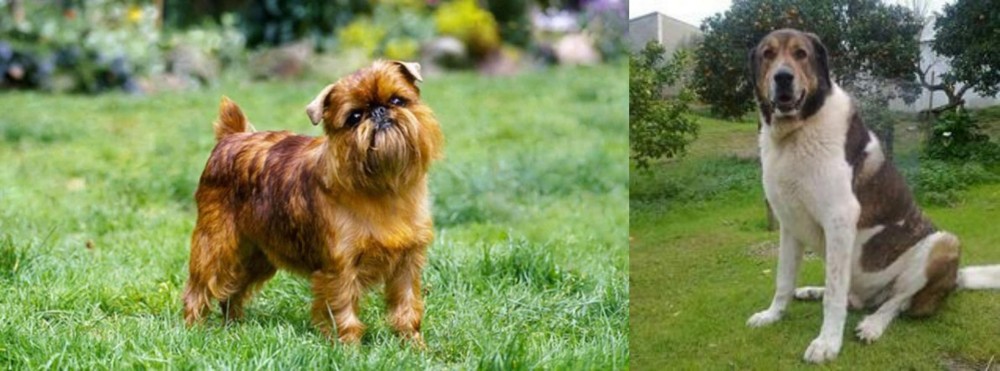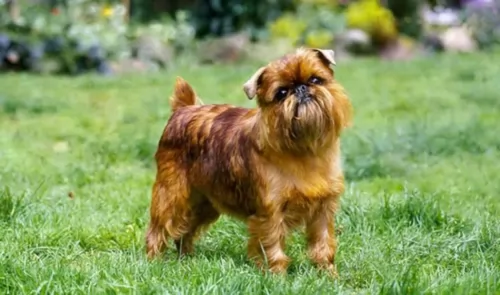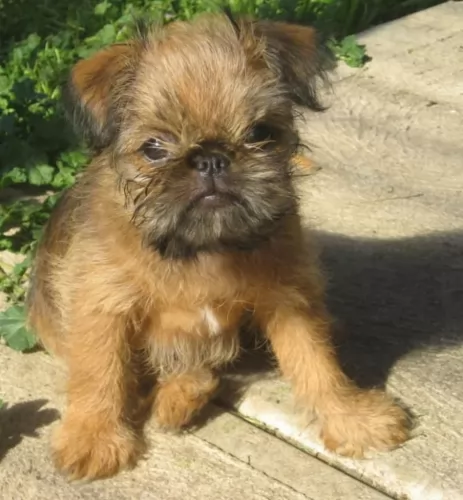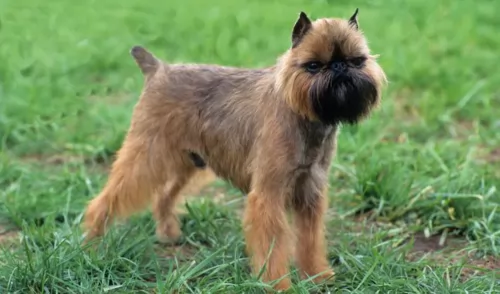 Petzlover
Petzlover Belgian Griffon is originated from Belgium but Cao de Gado Transmontano is originated from Portugal. Belgian Griffon may grow 63 cm / 24 inches shorter than Cao de Gado Transmontano. Belgian Griffon may weigh 59 kg / 130 pounds lesser than Cao de Gado Transmontano. Belgian Griffon may live 3 years more than Cao de Gado Transmontano. Belgian Griffon may have less litter size than Cao de Gado Transmontano. Belgian Griffon requires Moderate Maintenance. But Cao de Gado Transmontano requires Low Maintenance
Belgian Griffon is originated from Belgium but Cao de Gado Transmontano is originated from Portugal. Belgian Griffon may grow 63 cm / 24 inches shorter than Cao de Gado Transmontano. Belgian Griffon may weigh 59 kg / 130 pounds lesser than Cao de Gado Transmontano. Belgian Griffon may live 3 years more than Cao de Gado Transmontano. Belgian Griffon may have less litter size than Cao de Gado Transmontano. Belgian Griffon requires Moderate Maintenance. But Cao de Gado Transmontano requires Low Maintenance
 The Belgian Griffon isn’t your most attractive dog, but maybe its his quirky, gremlin looks that makes him such an adored pet for many. There are different varieties of Griffon, and the Belgian- and Brussels Griffon are one and the same. All small Belgian dogs have the same breed standards, with the Belgian having a rough coat The dog hails from Belguim and its ancestors were no doubt a mix of the Belgian street dog, the Stable Griffon and the Affenpinscher.
The Belgian Griffon isn’t your most attractive dog, but maybe its his quirky, gremlin looks that makes him such an adored pet for many. There are different varieties of Griffon, and the Belgian- and Brussels Griffon are one and the same. All small Belgian dogs have the same breed standards, with the Belgian having a rough coat The dog hails from Belguim and its ancestors were no doubt a mix of the Belgian street dog, the Stable Griffon and the Affenpinscher.
Later on in the 1800s, this combination was then crossed with the Pug, giving the dog the brachycephalic or flat faced look.
Unfortunately no written records were kept about the precise origin of this breed, but there is also the idea that the King Charles- and English Toy Spaniel were also involved in its development. These small dogs were bred to catch rats in the barns of European estates.
 The Cão de Gado Transmontano which is also known as the Transmontano Mastiff or Transmontano Cattle Dog is a large dog – in fact a giant dog breed. This is a rare molosser working dog, hailing from the region of Tras-os-Montes e Alto Douro Province in Portugal.
The Cão de Gado Transmontano which is also known as the Transmontano Mastiff or Transmontano Cattle Dog is a large dog – in fact a giant dog breed. This is a rare molosser working dog, hailing from the region of Tras-os-Montes e Alto Douro Province in Portugal.
The large dog has always been used to herd livestock and to also ward off wolves. It is believed that the dog’s roots come from the Tibetan Mastiff as well as a Portuguese cattle dog known as the Rafeiro do Alentejo. The dog also shares some similarities with the short-haired Estrela Mountain Dog.
In 1995 the breed was still exclusive to Portugal, but now the breed has been imported to Oregon, USA to be part of an experiment to document bigger breeds and their role in protecting livestock from wolves. They were re-introduced to north-east Oregon from 2008.
 There are different variations of this dog to give it its distinctive look and size. This quaint looking little Griffon canine comes with two different coat types - soft or wiry. With the Belgian Griffon, his wiry coat of red, tan or black will need to be brushed at least twice a week. Shedding with this dog is seasonal.
There are different variations of this dog to give it its distinctive look and size. This quaint looking little Griffon canine comes with two different coat types - soft or wiry. With the Belgian Griffon, his wiry coat of red, tan or black will need to be brushed at least twice a week. Shedding with this dog is seasonal.
He has a compact, sturdy little body, and he trots around with attitude. With his sharp pointed ears and whiskers, he has been given the nickname ‘bearded dog’. His dark black eyes are alert. He is self-confident, intelligent and curious breed, a great family pet and good with children if he has grown up with them in the home. He is good with other pets. The fact that this is a small breed and that he doesn’t have excessive energy levels, means he is adaptable to city- and country living.
 The Cão de Gado Transmontano is a large dog, believed to be the biggest of the Portuguese dog breeds. He is powerful and muscular with a large head and can stand up to 83cm in height and can weigh up to 65kg.
The Cão de Gado Transmontano is a large dog, believed to be the biggest of the Portuguese dog breeds. He is powerful and muscular with a large head and can stand up to 83cm in height and can weigh up to 65kg.
He is tough, and is quite comfortable living outside. He is a long-legged dog with a wide chest with medium length floppy ears and a long tail. The coat is fairly short although it can be in a variety of lengths. It is the medium length coated dog with the right coloring that is looked upon as a pure breed. The dog is white with large patches of brown, fawn, grey, brindle and black shades.
The Transmontano Mastiff is an intelligent, obedient dog who is also independent and stubborn. As with all dogs, it is important to have him trained and socialized as this makes him obedient and eager to please. He loves to be patted by his owners and is a dog which is easy to train, responding well to firmness and fairness.
He is calm and somewhat docile but at the same time he is energetic and alert, making him a good watchdog. He won’t do well cooped up in a tiny space. He gets on well with children and other pets in the home.
 The Belgian Griffon is an affectionate pet and often establishes a strong bond with one member of the family. You’ll have your Griffon with you for about 15 years so make sure he is trained and a pleasure to have around.They are difficult to train, being somewhat stubborn so they are going to require patience. They’re sensitive too, and they won’t respond well to aggressive treatment.
The Belgian Griffon is an affectionate pet and often establishes a strong bond with one member of the family. You’ll have your Griffon with you for about 15 years so make sure he is trained and a pleasure to have around.They are difficult to train, being somewhat stubborn so they are going to require patience. They’re sensitive too, and they won’t respond well to aggressive treatment.
They’re much more indoor dogs than outdoor dogs because they’re also vulnerable to heat stroke. They just want to come indoors and be with their human family, and when you do that for them, they’ll become a wonderful friend and companion to you.
 The Cão de Gado Transmontano may look like a fairly formidable dog but they aren’t aggressive. They are full of courage and are above all, loving and loyal to their human family.
The Cão de Gado Transmontano may look like a fairly formidable dog but they aren’t aggressive. They are full of courage and are above all, loving and loyal to their human family.
When you choose to have one of these large dogs as your pet, it is important to make sure he knows that you’re the leader. With training and socialization this dog is a gentle giant who makes an exceptional family pet.
 When you get your Griffon from a reputable breeder, you always have a better chance that he’ll be healthy. As it is, the Belgian Griffon has few hereditary health issues. However his dark eyes will have some genetic problems to contend with and he could suffer with progressive retinal atrophy. This is an illness which can lead to blindness
When you get your Griffon from a reputable breeder, you always have a better chance that he’ll be healthy. As it is, the Belgian Griffon has few hereditary health issues. However his dark eyes will have some genetic problems to contend with and he could suffer with progressive retinal atrophy. This is an illness which can lead to blindness
Syringomyelia – this is a neurological condition – an abnormality of the spinal cord – a disease which occurs more frequently in small breeds. It can cause your pet to endure a lot of pain.
Birthing Issues - these little dogs often have problems with giving birth, and a vet often has to intervene and perform a cesarean.
 The Cão de Gado Transmontano is a tough dog, used to spending long hours outside guarding sheep. These days however, he is also a companion dog and you’ll want to be aware of some common dog ailments that can strip him of his health and his joy of life.
The Cão de Gado Transmontano is a tough dog, used to spending long hours outside guarding sheep. These days however, he is also a companion dog and you’ll want to be aware of some common dog ailments that can strip him of his health and his joy of life.
Hip Dysplasia is a looseness with the hip joint, and while it can occur with all dogs, it is more common in large dogs. It’s a disease which can lead to arthritis, pain and also joint degeneration. It’s a disease which can be debilitating for the dog and you will need to get your dog to the vet.
This is a heart disease seen in large breed dogs and where the heart becomes weak and can’t properly pump blood throughout the body. Symptoms include coughing, weakness, difficulty with breathing as well as a fluid-distended abdomen.
 The Belgian Griffon will do well if you invest in high quality foods. You can make your own, but if you’re concerned about his health, it would be best to check what ingredients should go into his home-prepared meals to ensure he gets all the vitamins and minerals he needs.
The Belgian Griffon will do well if you invest in high quality foods. You can make your own, but if you’re concerned about his health, it would be best to check what ingredients should go into his home-prepared meals to ensure he gets all the vitamins and minerals he needs.
If you want to go with commercially manufactured dog foods, check with your vet about wet- and dry foods. Your vet will help with choosing a food appropriate to his size and age. Always ensure that there is clean, fresh water available to your pet.
Even though he is a small breed, he is fairly active and he will need his fair share of exercise like ball games and walks. Training and socialization are a must for him. You’ll notice that training isn’t particularly easy with this breed, and first time dog owners might not have the patience with him.
 Just because this is a large dog, doesn’t mean you need to over-feed him. He is muscular and athletic, and by watching his diet, he’ll continue to be strong, lean and healthy. You can feed him a top quality pet-food brand and include boiled chicken, rice and vegetables. Every now and then mix in some raw meat with his dog food to ensure that his skin remains free of rashes and itchiness. Fresh, cool water must be available to him day and night as he drinks abundantly.
Just because this is a large dog, doesn’t mean you need to over-feed him. He is muscular and athletic, and by watching his diet, he’ll continue to be strong, lean and healthy. You can feed him a top quality pet-food brand and include boiled chicken, rice and vegetables. Every now and then mix in some raw meat with his dog food to ensure that his skin remains free of rashes and itchiness. Fresh, cool water must be available to him day and night as he drinks abundantly.
Some dog breeds need to be trimmed or stripped to look good, and dog owners often invest in expensive equipment to groom their pets themselves, Fortunately the large Cão de Gado Transmontano is a low maintenance dog and all you’ll need to do is give him a good brush-down twice a week.
Check his eyes, ears, teeth and nails regularly. Remember that dental hygiene is imperative and special canine toothbrush and toothpaste is available to brush your dog’s teeth 2 or 3x a week to get rid of plaque and to prevent gum disease and tooth decay.